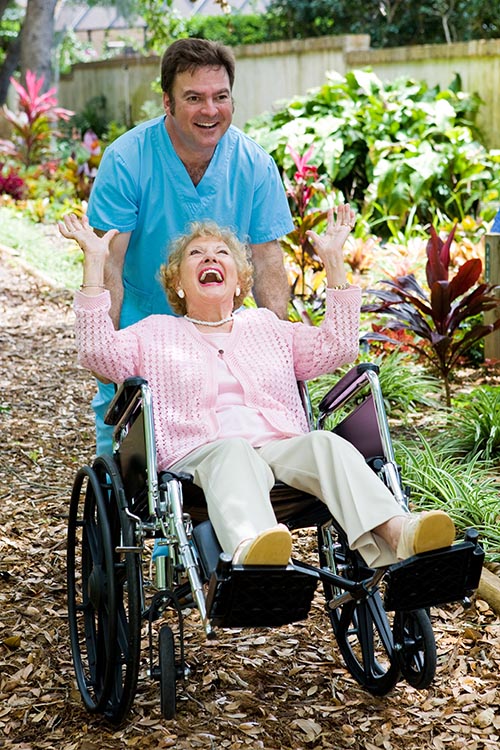Paying for home health care
Home health services can be costly. You may need to pay for home care services directly, or costs may be covered through insurance or other public or private sources.
- Medicare. Medicare may pay for medical home health care services through a certified home health care agency, if a physician orders these services. Services covered by Medicare include skilled nursing assistance, or physical, speech or occupational therapy. If your home health services are covered under Medicare, your doctor, care manager or discharge planner will probably make arrangements for a home health care agency.
- Medicaid. Depending on your income and assets, if you are over 65 you may be eligible for Medicaid coverage.
- Older Americans Act. This federal program funds state and local programs that provide services to frail and disabled individuals who are 60 years old or older.
- Veterans Affairs. If you are a veteran and at least 50 percent disabled due to a service-related injury or illness, you may be eligible for medical services through Veterans Affairs hospital-based home care services.
- Community organizations. Depending on your situation and finances, certain community organizations cover home care costs.
Insurance. Many insurance programs cover some home health care services for short-term medical needs. However, long-term coverage varies. Long term care policies are available through private insurance companies and the federal government.
Types of home health care that Medicare will pay for
Section IV.g. Home Health Care Benefit (Part A and B)
If you qualify for the home health benefit, Medicare covers the following types of care:
- Medicare pays in full for skilled nursing care, which includes services and care that can only be performed safely and effectively by a licensed nurse. Injections (and teaching patients to self-inject), tube feedings, catheter changes, observation and assessment of a patient's condition, management and evaluation of a patient's care plan, and wound care are examples of skilled nursing care that Medicare may cover.
- Medicare pays in full for a home health aide if you require skilled services. A home health aide provides personal care services including help with bathing, using the toilet, and dressing. If you ONLY require personal care, you do NOT qualify for the Medicare home care benefit.
- Skilled therapy services. Physical, speech and occupational therapy services that can only be performed safely by or under the supervision of a licensed therapist, and that are reasonable and necessary for treating your illness or injury. Physical therapy includes gait training and supervision of and training for exercises to regain movement and strength to a body area. Speech-language pathology services include exercises to regain and strengthen speech and language skills. Occupational therapy* helps you regain the ability to do usual daily activities by yourself, such as eating and putting on clothes. Medicare should pay for therapy services to maintain your condition and prevent you from getting worse as long as these services require the skill or supervision of a licensed therapist, regardless of your potential to improve.
- Medical social services. Medicare pays in full for services ordered by your doctor to help you with social and emotional concerns you have related to your illness. This might include counseling or help finding resources in your community.
- Medical supplies. Medicare pays in full for certain medical supplies provided by the Medicare-certified home health agency, such as wound dressings and catheters needed for your care.
Types of home health care Medicare will not pay for
Section IV.g. Home Health Care Benefit (Part A and B)
Medicare's home health care benefit is limited. Medicare does not cover many home care services. Medicare home health care does not cover:
- 24-hour a day care at home
- Prescription drugs
- To get Medicare drug coverage, you need to enroll in a Medicare Part D plan. You can choose a stand-alone Medicare private drug plan (PDP), or a Medicare Advantage plan with Part D coverage (MA-DP).
- Meals delivered to your home
- Homemaker or custodial care services (i.e. cooking, shopping, laundry)
- Unless custodial care is part of the skilled nursing and/or skilled therapy services you receive from a home health aide or other personal care attendant.
The Medicare hospice benefit may pay for some of these items and services for people at the end of life.
 Before modern medicine, caring for someone in the home was quite common, and hospitalization was rare. Increasing numbers of patients need continuing professional medical services when they return home. Professional home health care services include a broad range of care and support services for those who are recovering from a hospital stays. Patients, who are chronically ill, injured, disabled, or need medical, nursing, social, or therapeutic treatment and/or assistance with the essential activities of daily living.
Before modern medicine, caring for someone in the home was quite common, and hospitalization was rare. Increasing numbers of patients need continuing professional medical services when they return home. Professional home health care services include a broad range of care and support services for those who are recovering from a hospital stays. Patients, who are chronically ill, injured, disabled, or need medical, nursing, social, or therapeutic treatment and/or assistance with the essential activities of daily living.